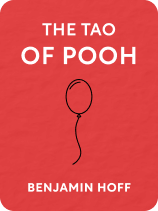

This article is an excerpt from the Shortform book guide to "The Tao of Pooh" by Benjamin Hoff. Shortform has the world's best summaries and analyses of books you should be reading.
Like this article? Sign up for a free trial here .
What is the Winnie-the-Pooh Backson? How does a Bisy Backson contradict the lessons from The Tao of Pooh?
The Bisy Backson is the name for a person that is always on the move. In The Tao of Pooh, like Winnie-the-Pooh, Backson is not a good thing.
Keep reading to understand the Bisy Backson and what it means in relation to The Tao of Pooh.
Principle 4: Don’t Be a Bisy Backson
If the Pooh Way is the way of inaction, then the opposite behavior would be overaction. In the world of Pooh, a person who is always moving, always searching for something they don’t have or a way to get more is called a “Bisy Backson,” which translates to “Busy, Back Soon!” The Backson is someone who is never at peace or content. They’re the ones pacing the floor, fidgeting, or rattling the change in their pockets. They must always be exerting the full capacity of their energy and feel like there’s never enough time.
A story from the writings of Chuang-tse provides a description of a Bisy Backson:
A man hated seeing his footprints behind him and his shadow. He thought he could outrun them, so he ran fast. But the footprints and shadow were still there. He reasoned he wasn’t running fast enough and increased his speed. He kept running faster and faster until he finally collapsed from exhaustion and died. If he’d simply stopped moving, there would have been no footprints. If he’d stopped in the shade, there would have been no shadow.
So what drives the Bisy Backson? Likely, they expend this energy in search of a reward. Science, business, and religion all perpetuate the idea of a Big Reward for those who work hard and earn it. People chase the new cure or technology, the fancy penthouse, or the ticket to Heaven. But this lifestyle is never satisfying or successful because the need for more is never satiated.
In this frantic and unsatisfied place, the natural rhythm of life is overshadowed. There is no happiness or pride because the search for what’s just out of reach will never end. And when you don’t get what you want or what you get doesn’t feel like enough, you will blame the world instead of your inability to listen to it. If you want to be healthy, calm, and happy, do the opposite of the Bisy Backson.
How the History of the Backson Affects the Present
The first-known Backsons were the Puritans, who landed in the New World and set about manipulating it in every way possible. They worked tirelessly to cultivate the vast land for agriculture, but their efforts failed. They were close to starvation before the native residents helped them learn to farm according to the cycles of nature. Although things got better, this Backson society could not sit still during the off season, and they continued to force the land to bend to their will.
Centuries later, the result of manipulating this once naturally fertile land using chemical stimulants is fruits and vegetables that have no flavor and a small amount of nutritional value. What would have happened if the Backsons had viewed the land as beautiful and rich and found a way to live with it harmoniously?
From this group, a line of descendants grew under this standard of work to conquer and receive their just rewards. We see this ideology at play in modern society, where many do not see the world as a friendly place full of natural power. Instead, the world is a place to continue conquering, and anything or anyone that gets in the way is a threat. Progress is defined by struggle and triumph—it’s change and growth developed from the outside in, rather than the other way around.
This overexertion of power destroys the natural inclination of living things to adapt and grow. Whether it’s the “Bulldozer Backson,” who wants to develop every ounce of available land, or the “Bigoted Backson,” who wants to control the fates of others for personal benefit, the Backson will struggle with everything they have to change the world around them so they can receive their reward without having to change themselves.
Bisy Backson: Trying to Save Time
Saving Time is another motivation for Bisy Backson behavior. There are many examples of Backson society trying to save time: fast food restaurants, grocery stores, microwaves, pesticides, and others. The sole purpose is to create ways to do things fast and efficiently, leaving the person or natural element as a secondary priority.
However, all these efforts to save time do not actually lead to more time. Life moves at an even faster clip than before these things were invented, and all the time saved is filled up with more distractions. The problem is that time is not like water, stamps, or sand. You can’t bottle it up and use it for later. In the effort to create ways to save time, you actually use time. If you spend all of your time trying to figure out how to save it, you’re wasting it.
Winnie-the-Pooh Backson
When Christopher Robin asks Pooh what he enjoys most in the world, Pooh is quick to assume that eating honey is what he likes best. But when he thinks about it further, he realizes the moment before he eats the honey is the best part, even better than the honey itself.
All of the Backson’s efforts to receive their reward and save time are futile because the reward is never as good as the space that exists between wanting the reward and receiving it. Life is built up of periods where you work to attain goals and periods of goal attainment. The Backson assumes that the goal is what leads to happiness, but Pooh understands that happiness lies in the before. This before can be called anticipation, but a Taoist would call it a moment of awareness.
Goals and rewards matter, but happiness and contentment lie in the process of getting there. If you work toward your goals in the wrong way, you will always feel frustrated with the process, drained, and lacking. These feelings will also occur when you work toward the wrong goals. If the goal and process are both appropriate, both can be enjoyed simply for what they are.
Awareness is understanding that the simple act of working through the process is powerful and useful. When you focus on what you’re doing now, rather than what your actions will get you, you can close the door on Big Reward and Saving Time mentalities and find eternal joy in simply living.

———End of Preview———
Like what you just read? Read the rest of the world's best book summary and analysis of Benjamin Hoff's "The Tao of Pooh" at Shortform .
Here's what you'll find in our full The Tao of Pooh summary :
- How Winnie-the-Pooh perfectly models the principles of Taoism
- The 6 principles of Taoism reflected in Pooh's adventures
- How to become Winnie-the-Pooh and unlock a magic inside of you






